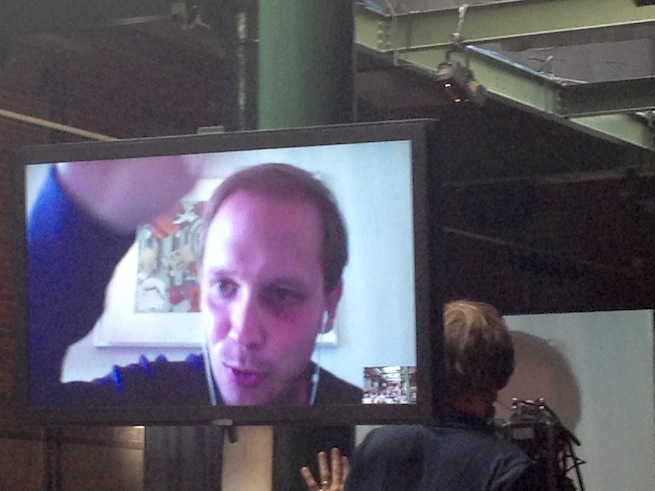MALMÖ, Sweden–Pirate Bay cofounder Peter Sunde made a virtual appearance at Swedish media conference Media Evolution yesterday, in which he shared his thoughts on piracy, privacy, and his various projects dealing with both of those subjects.
One thing Sunde made perfectly clear during his talk? He doesn’t consider himself part of the entrepreneurial culture.
“I actually hate being called an entrepreneur,” Sunde said via a Skype video call that was broadcasted across multiple screens during the panel. “Most entrepreneurs, when they become successful, they turn into idiots… It’s the same thing with rockstars and entrepreneurs: big money and big egos.
“So I think we should stop celebrating entrepreneurs and just celebrate innovation instead,” he said.Sunde didn’t reference anyone in particular, but it’s easy to find some examples. For instance, wealthy entrepreneur Sean Parker of Spotify and Napster, who is arguably relevant to the new era of digital music for a completely different reason.
Sunde’s views on entrepreneurs themselves might seem a bit odd when you consider the list of wildly popular services he’s been involved with over the last several years. He’s cofounder of the decade-old torrent sharing site The Pirate Bay, cofounder of crowdsourcing platform Flattr, and most recently, cofounder of NSA-proof messaging app Hemlis. But then again, Sunde’s status as a fugitive for violating various copyright laws means he’d likely never see money from one of these projects anyways — making his motivation remain solely on making those projects really good.
A lot of what he mentioned in his talk has been touched on before in other Q&A’s or talks. I’ve embedded the audio from his talk via Soundcloud below, but here are some of the high points:
- Sunde wishes The Pirate Bay wouldn’t have chosen the “pirate” labeling, because of its negative connotation, which understandably takes away from the group’s views on copyright laws.
- Reaffirming earlier statements, when asked where he hopes The Pirate Bay will be in 10 years, Sunde said “shut down” — citing the need for new and better services to take its place.
- He’s wary of any new crop of innovations being branded as a “solution,” because it’s often times not innovation for the sake of creativity, only for consuming. “We don’t build things to be creative. We build things to consume,” he said.
- Spotify, Sunde said, isn’t a “solution” to piracy for the music industry, which is stuck on developing ways to consume music rather than providing ways to make it easier to create new music. “We never talk about the musicians who create for fun. Not all music is about making money.:
- Sunde said he’s all for theft, and for people taking what they need within reason. This is especially true when it comes to “taking” a copy of something, he said.
This story is part of our coverage of the Media Evolution conference in Malmö, Sweden this week. Disclosure: Media Evolution paid for my airfare and hotel. My coverage remains objective.
VentureBeat's mission is to be a digital town square for technical decision-makers to gain knowledge about transformative enterprise technology and transact. Learn More

